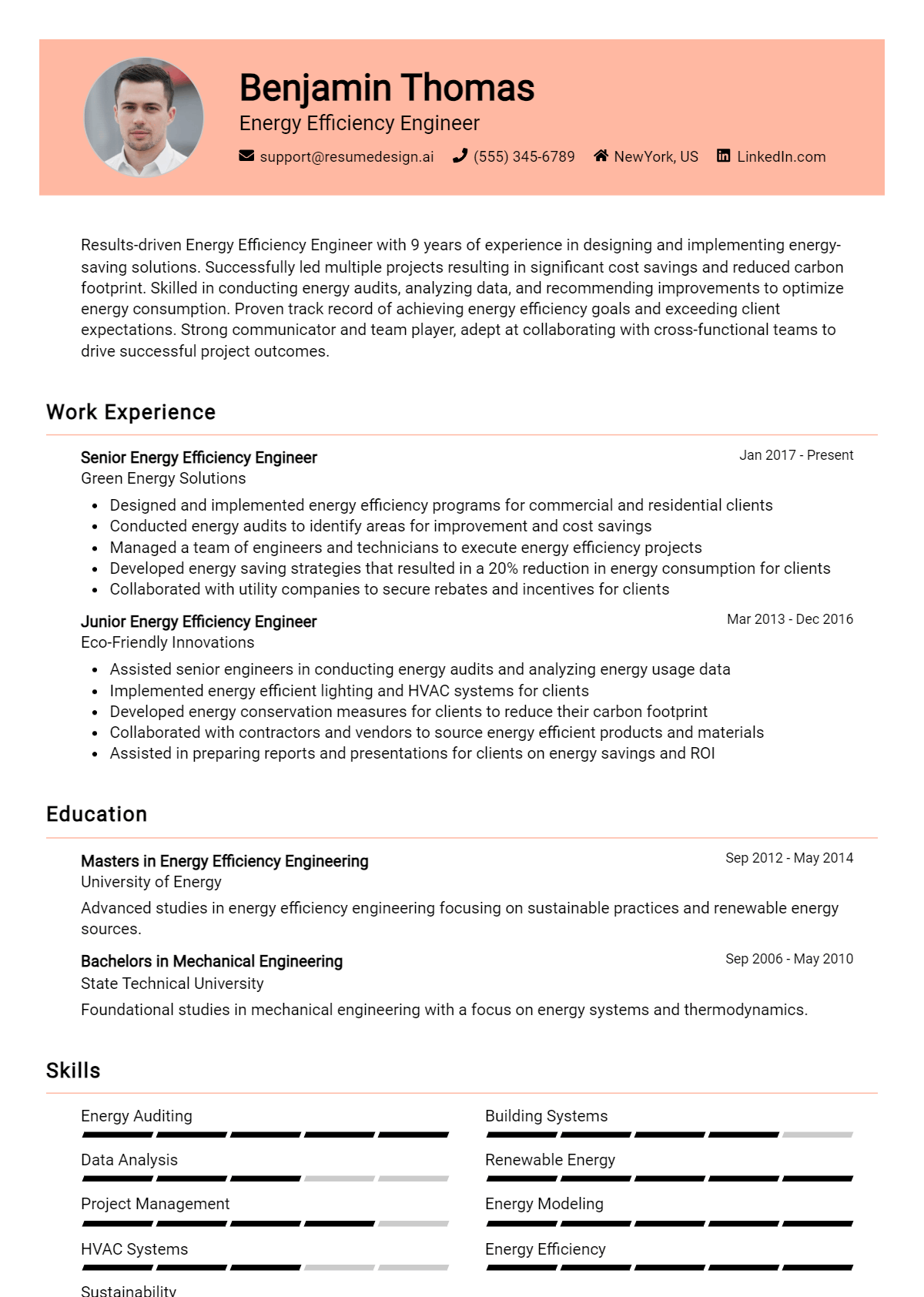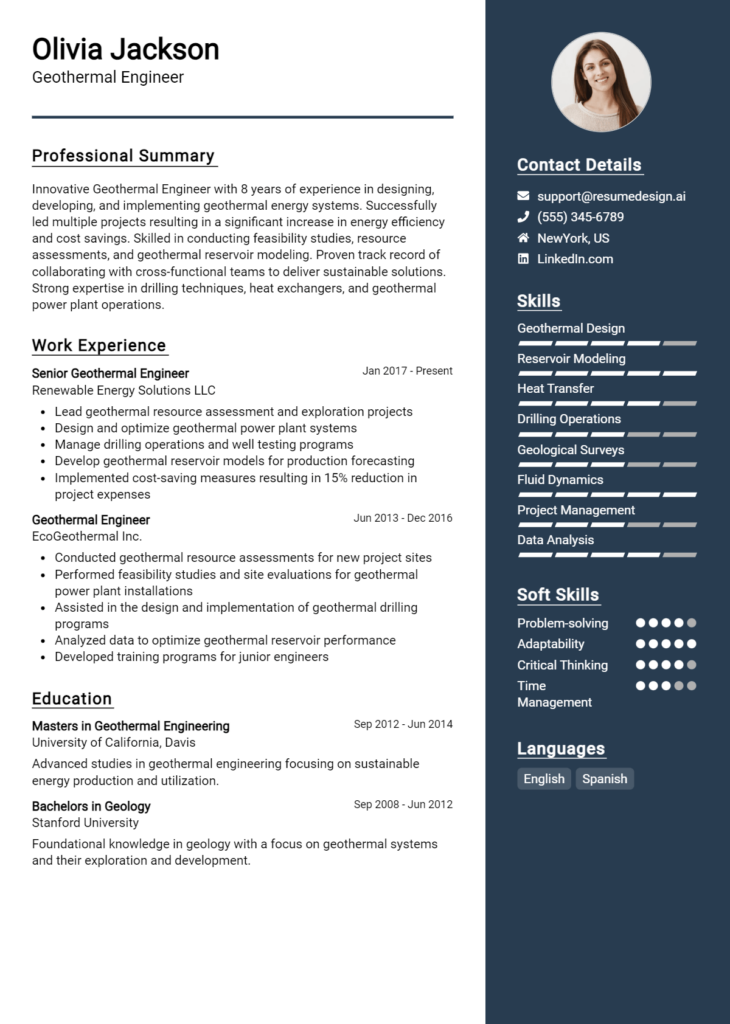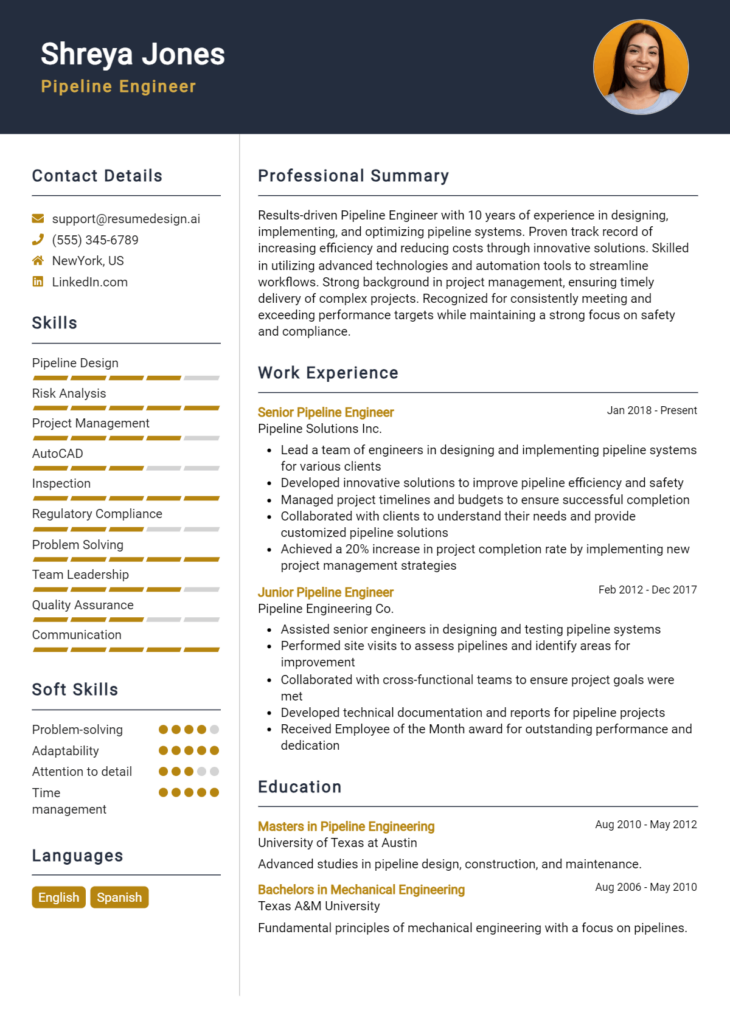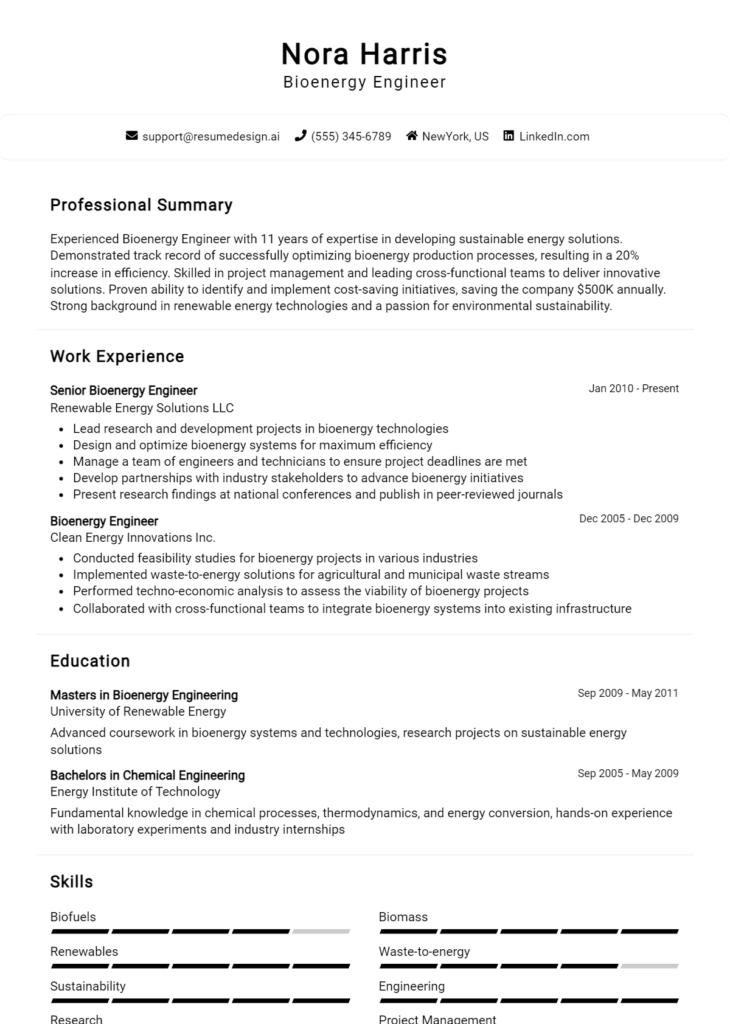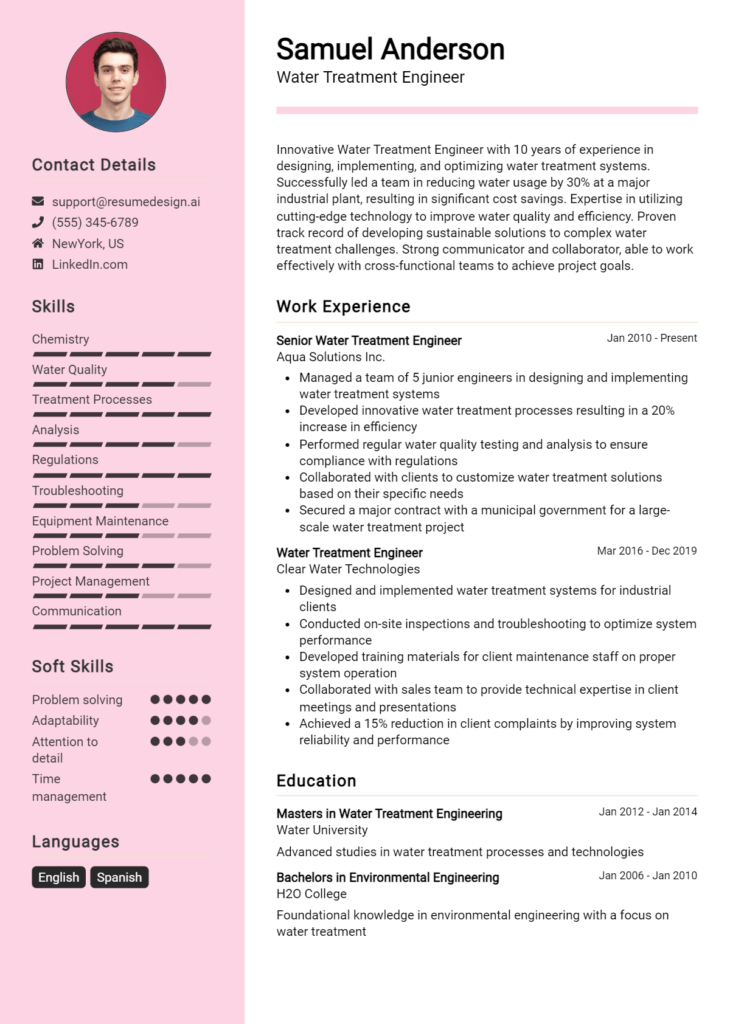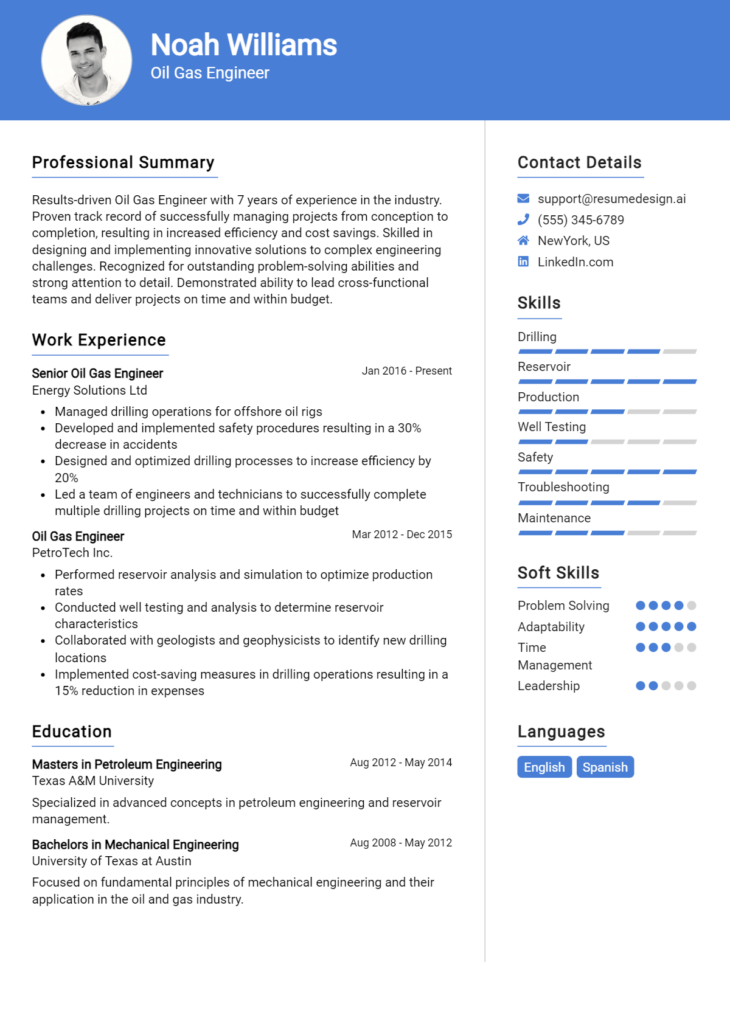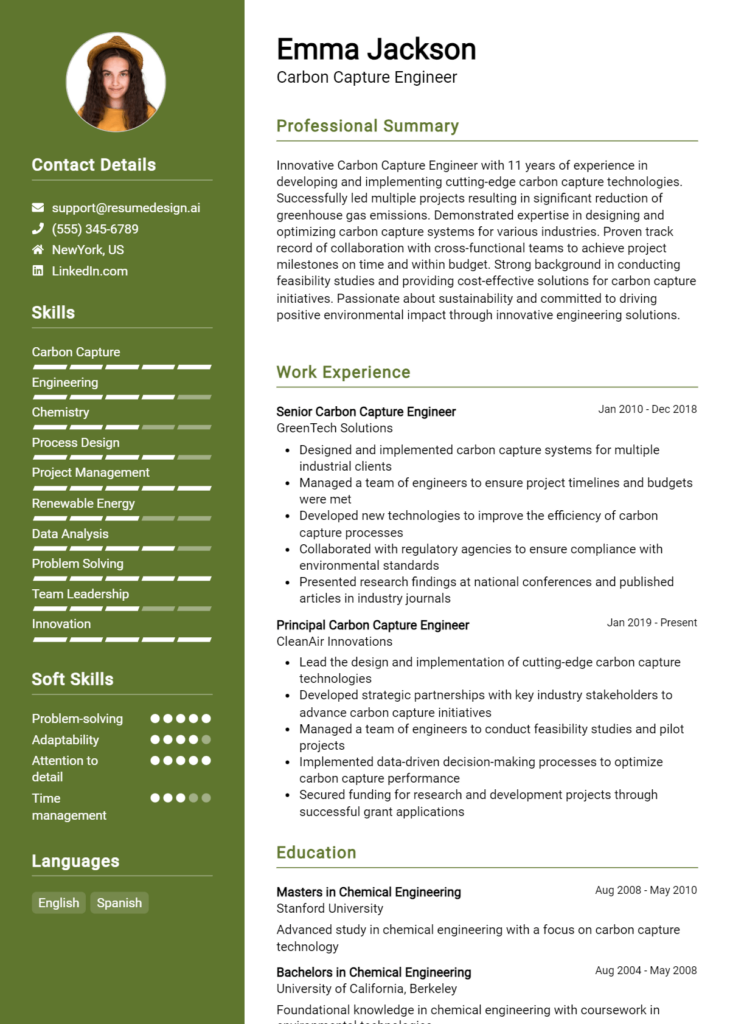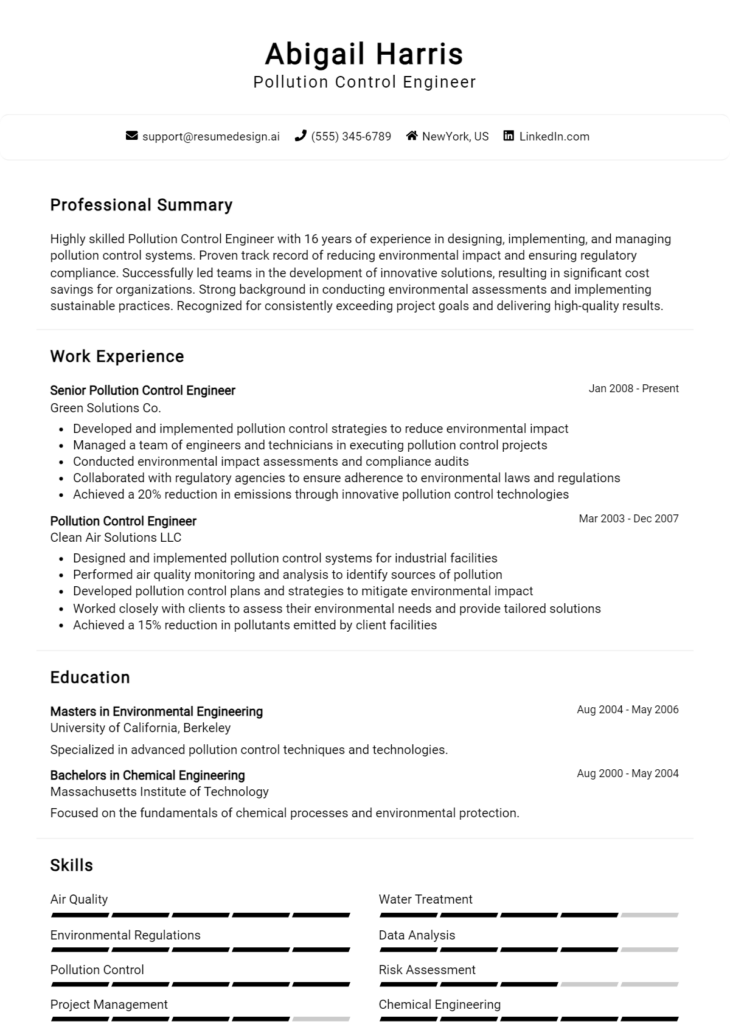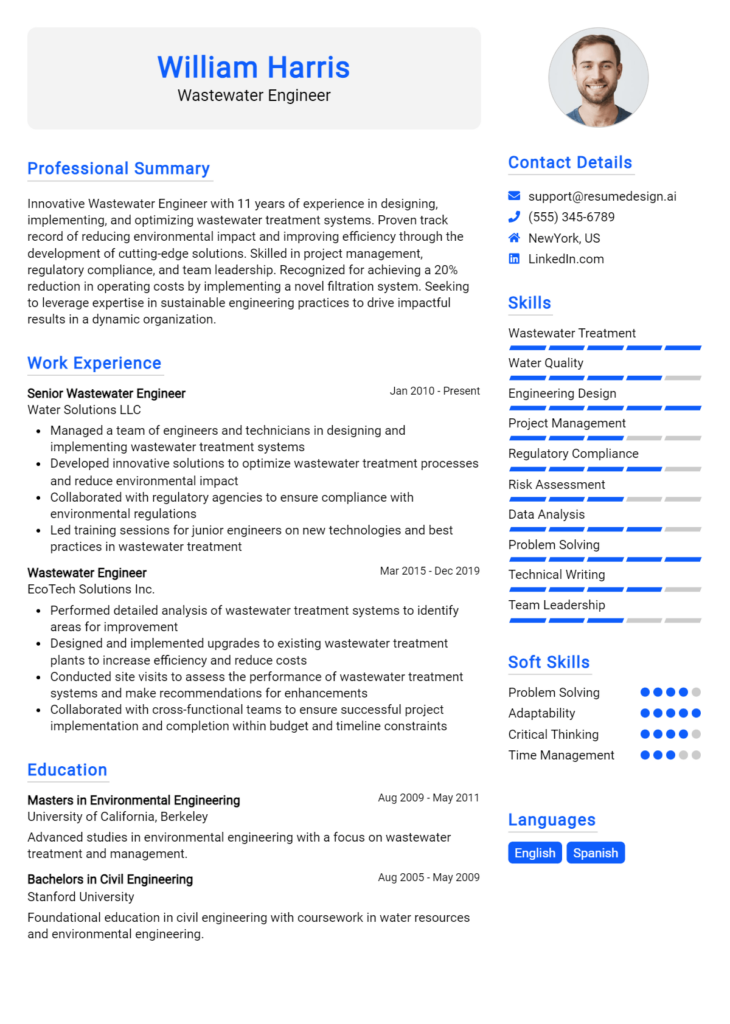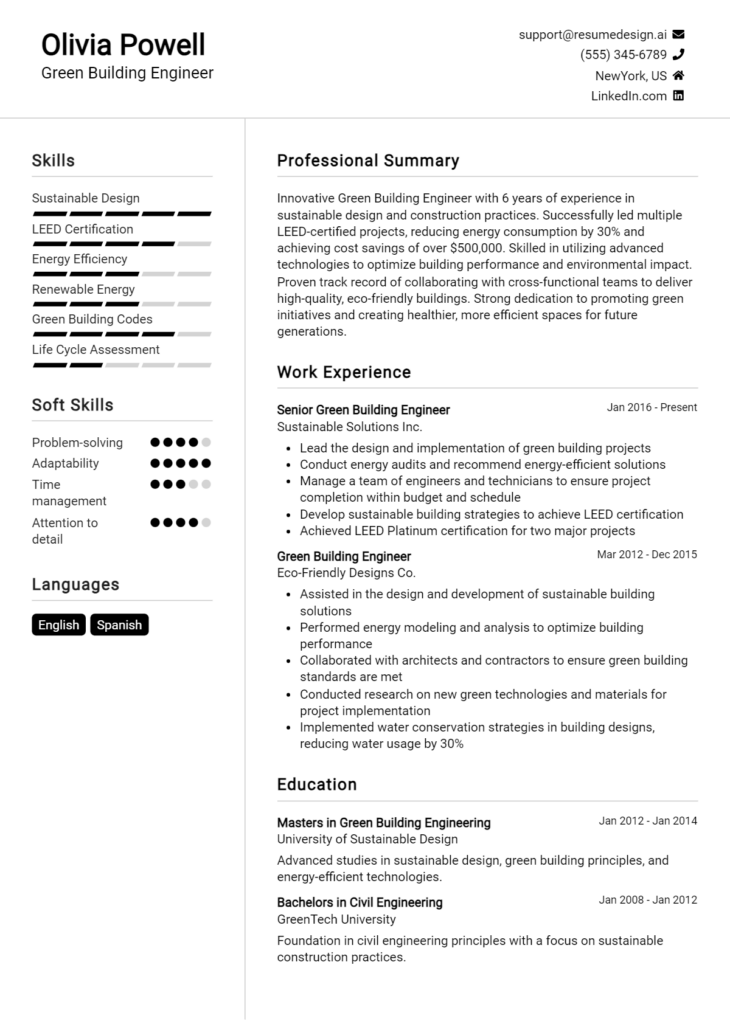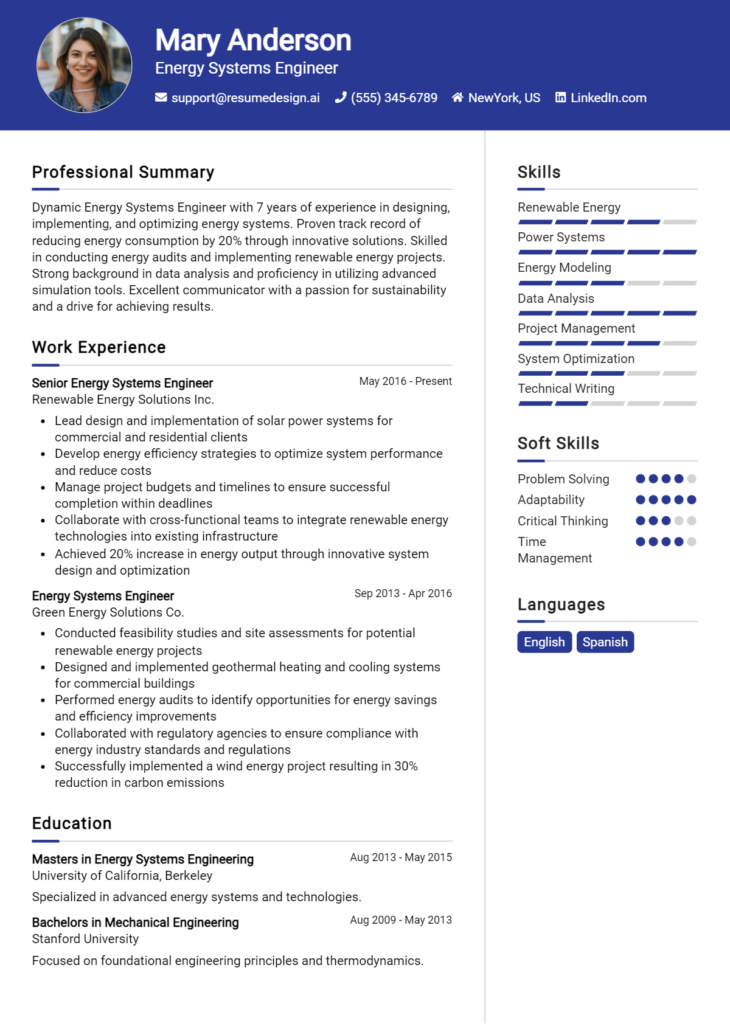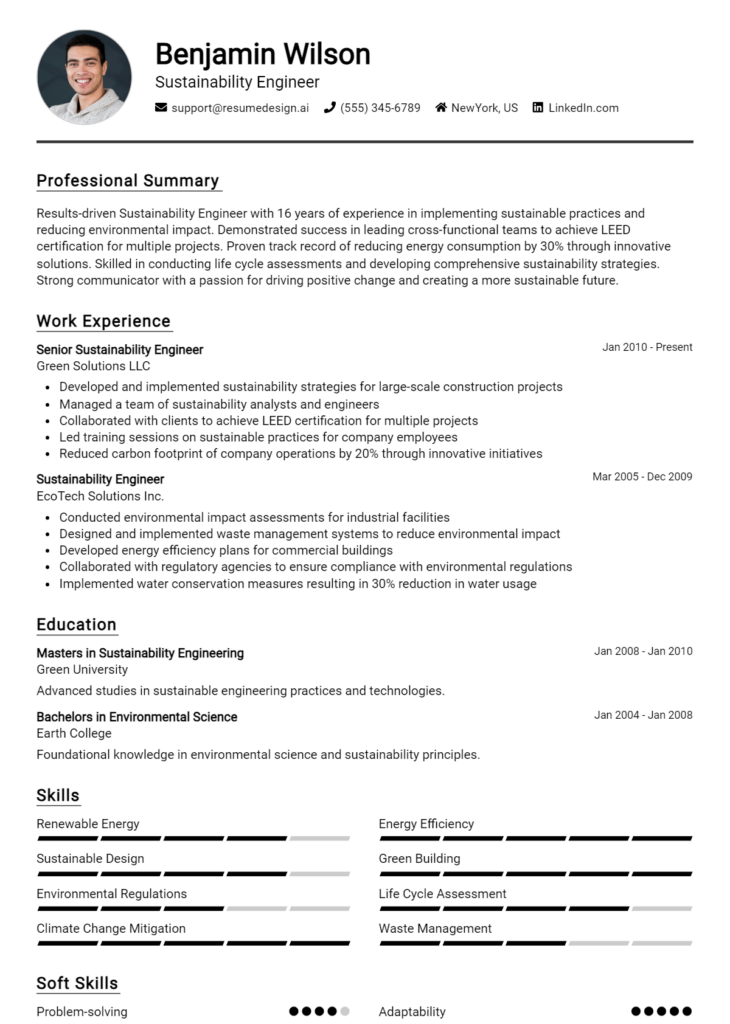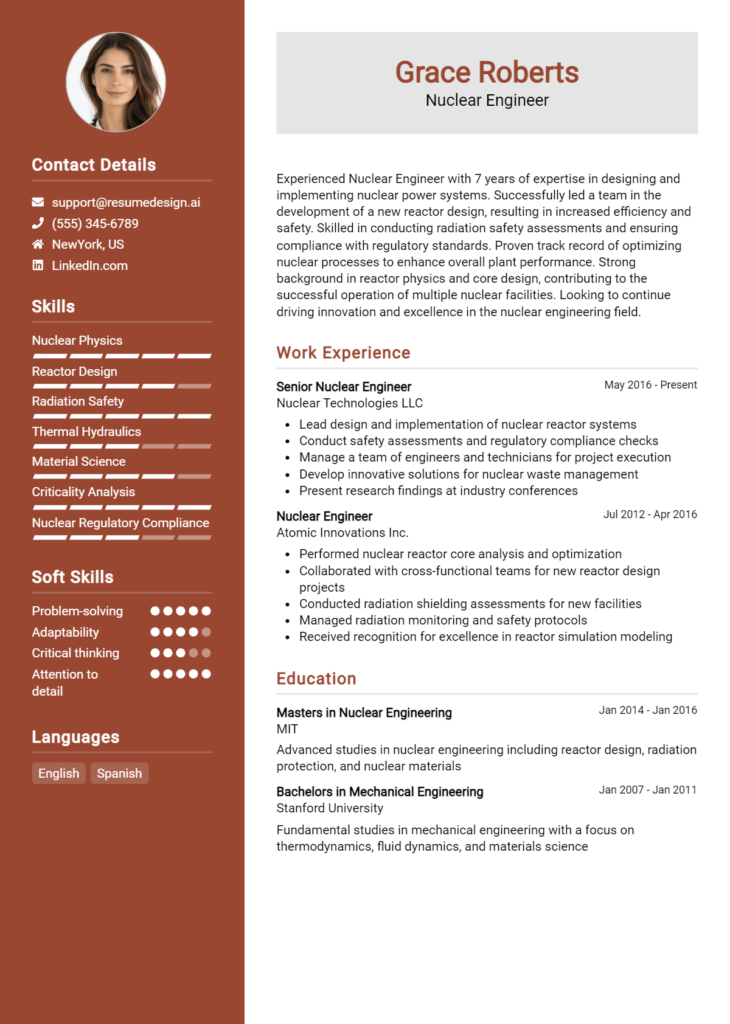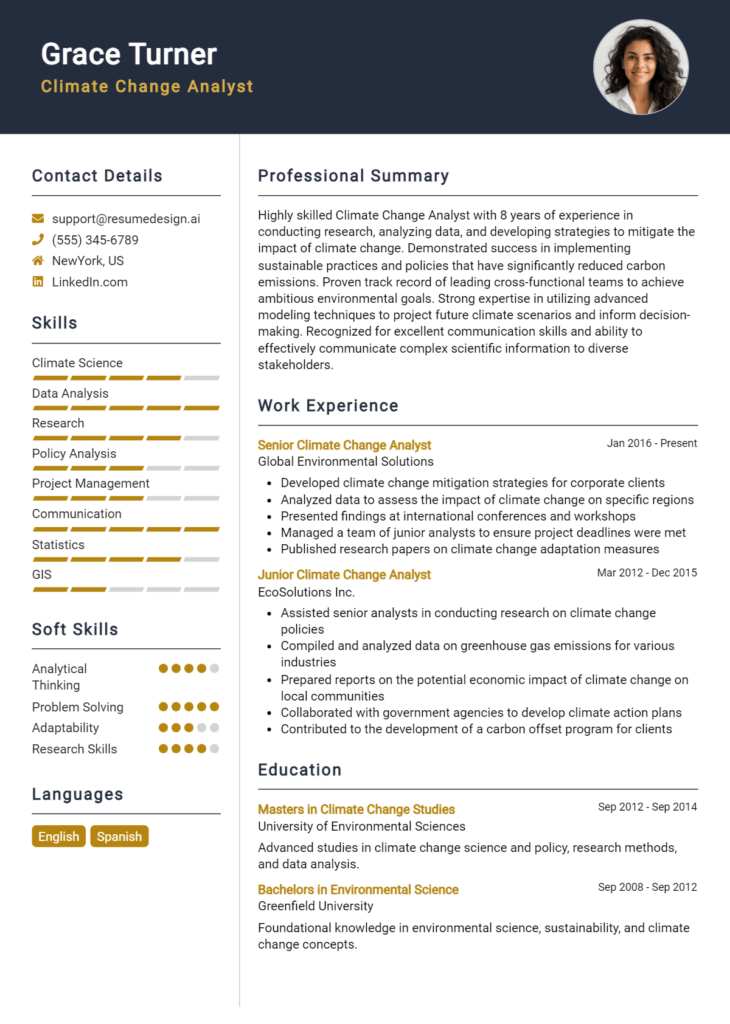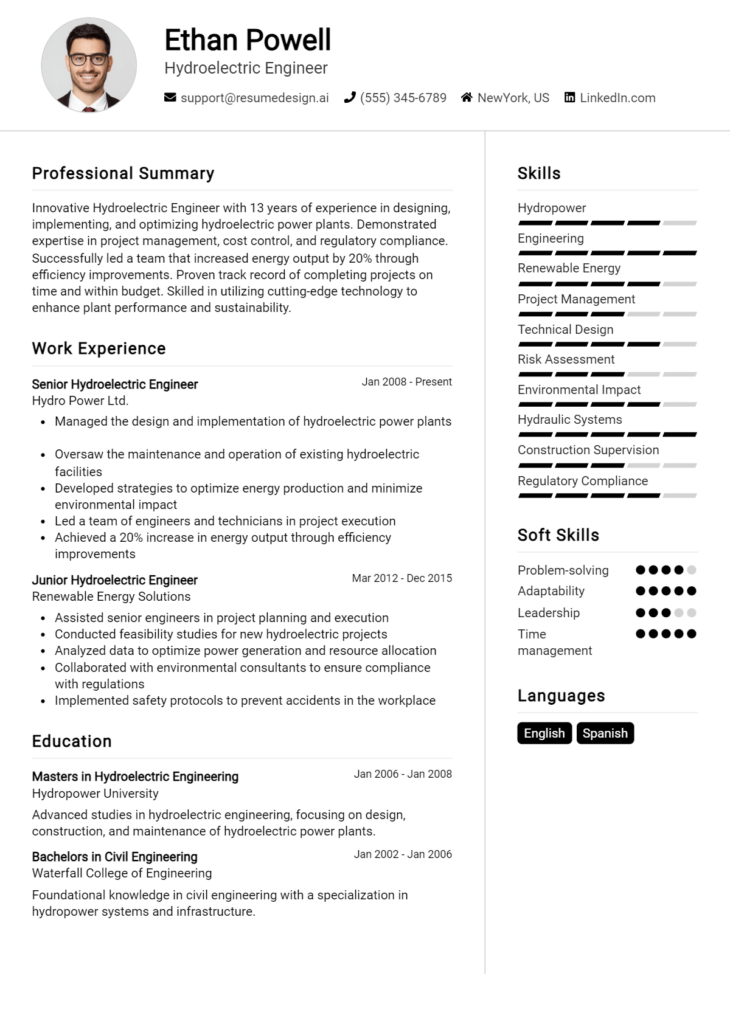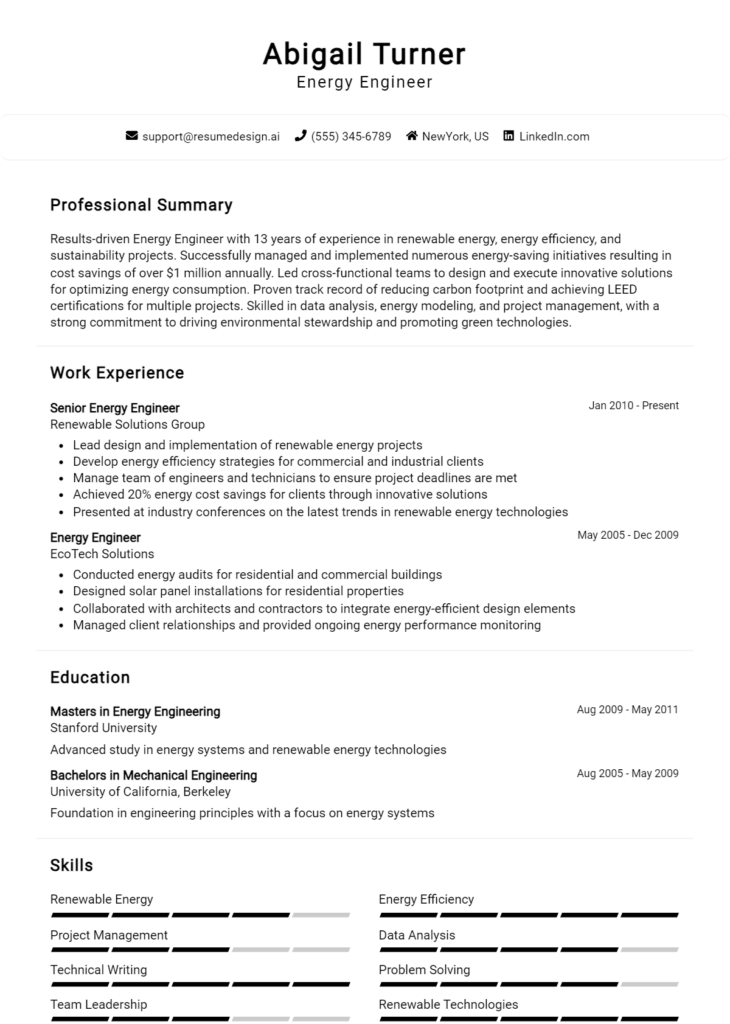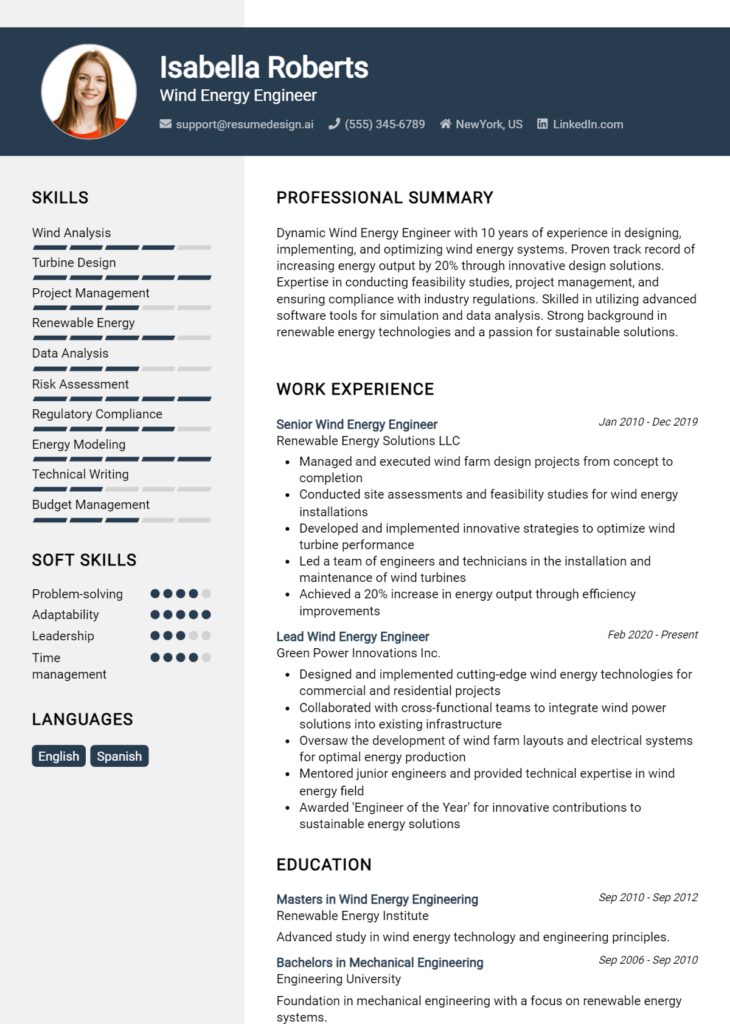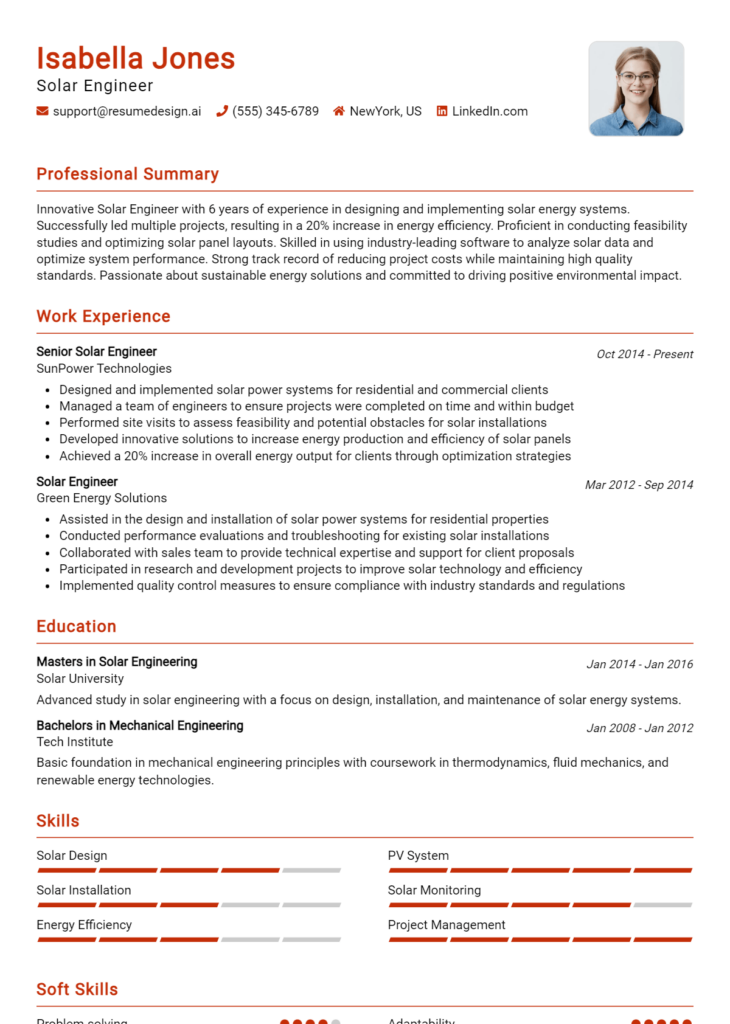Energy Efficiency Engineer Core Responsibilities
An Energy Efficiency Engineer plays a crucial role in enhancing an organization's sustainability initiatives by analyzing energy consumption, recommending efficiency improvements, and implementing energy-saving technologies. This position requires strong technical, operational, and problem-solving skills to bridge various departments, including engineering, operations, and finance. The ability to communicate complex concepts clearly is essential for fostering collaboration. A well-structured resume showcasing these qualifications can significantly impact career advancement and contribute to the organization's overall energy goals.
Common Responsibilities Listed on Energy Efficiency Engineer Resume
- Conduct energy audits and assessments to identify efficiency opportunities.
- Develop and implement energy conservation measures for facilities.
- Analyze data to assess the effectiveness of energy-saving initiatives.
- Collaborate with cross-functional teams to integrate energy efficiency into operations.
- Prepare detailed reports and presentations on energy usage and savings.
- Stay updated on energy efficiency technologies and regulations.
- Assist in budget planning for energy efficiency projects.
- Provide training and support to staff on energy management practices.
- Evaluate and recommend energy-efficient products and services.
- Monitor and report on the progress of energy efficiency programs.
- Engage with stakeholders to promote energy-saving initiatives.
High-Level Resume Tips for Energy Efficiency Engineer Professionals
A well-crafted resume is essential for Energy Efficiency Engineer professionals seeking to make their mark in a highly competitive field. Your resume serves as the first impression a potential employer has of you, making it crucial to present your skills and achievements in a compelling way. It should not only highlight your technical expertise but also showcase your contributions to energy efficiency initiatives. In this guide, we will provide practical and actionable resume tips specifically tailored for Energy Efficiency Engineer professionals, allowing you to stand out to hiring managers and secure the job you desire.
Top Resume Tips for Energy Efficiency Engineer Professionals
- Tailor your resume to align with the job description, using keywords and phrases that reflect the specific requirements of the position.
- Showcase relevant work experience that directly relates to energy efficiency projects, including internships, co-op positions, or volunteer work.
- Quantify your achievements by providing numerical data and metrics that demonstrate your impact on energy savings or project success.
- Highlight industry-specific skills such as energy modeling, building performance analysis, and familiarity with energy efficiency standards and regulations.
- Include any relevant certifications, such as LEED, BPI, or RESNET, to validate your expertise in energy efficiency practices.
- Utilize a clean and professional format that makes it easy for employers to scan your resume for key information.
- Incorporate a strong summary or objective statement that clearly outlines your career goals and what you bring to the table as an Energy Efficiency Engineer.
- Emphasize your problem-solving skills by detailing specific challenges you faced in previous roles and how you overcame them to achieve energy efficiency goals.
- Keep your resume concise, ideally one page, focusing on the most relevant and impactful information to avoid overwhelming the reader.
By implementing these tips, you can significantly increase your chances of landing a job in the Energy Efficiency Engineer field. A well-structured and tailored resume will not only showcase your qualifications effectively but also demonstrate your commitment to the principles of energy efficiency, making you a standout candidate in this vital industry.
Why Resume Headlines & Titles are Important for Energy Efficiency Engineer
In the competitive field of energy efficiency engineering, the significance of a well-crafted resume headline or title cannot be overstated. A strong headline serves as the first impression for hiring managers, providing a succinct yet powerful summary of a candidate's key qualifications. It not only grabs attention but also sets the tone for the resume, indicating relevance to the position being applied for. An effective headline should be concise, directly related to energy efficiency engineering, and should encapsulate the essence of the candidate's expertise, making it easier for employers to quickly assess their fit for the role.
Best Practices for Crafting Resume Headlines for Energy Efficiency Engineer
- Keep it concise: Aim for no more than 10-12 words.
- Be role-specific: Tailor the headline to reflect the energy efficiency engineering field.
- Highlight key achievements: Include quantifiable results or notable certifications.
- Use industry keywords: Incorporate relevant terminology to pass through applicant tracking systems.
- Showcase your unique selling proposition: Emphasize what sets you apart from other candidates.
- Avoid jargon: Ensure clarity by using straightforward language that is easy to understand.
- Make it impactful: Use powerful action words to convey confidence and capability.
- Update regularly: Adjust the headline to match the specific job description and requirements.
Example Resume Headlines for Energy Efficiency Engineer
Strong Resume Headlines
Certified Energy Efficiency Engineer with 10+ Years of Experience in Sustainable Design
Results-Driven Energy Consultant: Achieved 30% Reduction in Energy Costs for Major Clients
Innovative Energy Efficiency Specialist with Proven Track Record in LEED Certification Projects
Weak Resume Headlines
Energy Engineer Looking for Job
Resume of an Energy Professional
Strong headlines are effective because they are specific, result-oriented, and highlight the candidate's unique skills and achievements relevant to the role of an energy efficiency engineer. They immediately communicate the value the candidate brings to potential employers. In contrast, weak headlines fail to impress because they are vague and lack specificity, making it difficult for hiring managers to understand the candidate's qualifications or the relevance of their experience. A powerful headline should compel the reader to continue exploring the resume, while a weak one may lead to it being overlooked entirely.
Writing an Exceptional Energy Efficiency Engineer Resume Summary
A well-crafted resume summary is essential for an Energy Efficiency Engineer, as it serves as the first impression for hiring managers. In a competitive job market, a strong summary quickly captures attention by highlighting key skills, relevant experience, and notable accomplishments that align with the job role. This concise yet impactful section should be tailored specifically to the position being applied for, ensuring that it resonates with the employer's specific needs and expectations. A compelling summary not only showcases a candidate's qualifications but also sets the tone for the rest of the resume, making it a critical element in the job application process.
Best Practices for Writing a Energy Efficiency Engineer Resume Summary
- Quantify achievements to provide clear evidence of your contributions and impact.
- Focus on relevant skills that align with the job description, such as energy modeling, analysis, or project management.
- Tailor your summary to each job application, reflecting the specific requirements and language from the job posting.
- Keep it concise, ideally within 3-5 sentences, to maintain the reader's attention.
- Use action verbs to convey a sense of proactivity and results-oriented mindset.
- Highlight any certifications or specialized training in energy efficiency or related fields.
- Incorporate industry-specific terminology to demonstrate your familiarity with the sector.
- Show a balance between technical expertise and soft skills, such as teamwork and communication.
Example Energy Efficiency Engineer Resume Summaries
Strong Resume Summaries
Results-driven Energy Efficiency Engineer with over 7 years of experience in implementing energy-saving solutions that reduced costs by 25% for commercial clients. Proficient in energy modeling software and building performance analysis, leading to a 30% improvement in energy ratings.
Detail-oriented professional with a Master’s degree in Energy Management and 5 years of experience in conducting energy audits. Successfully identified and executed projects that led to a 15% reduction in energy consumption for a major manufacturing facility.
Dedicated Energy Efficiency Engineer with a track record of developing and managing projects that achieved a 40% decrease in greenhouse gas emissions for municipal clients. Expertise in renewable energy systems and building automation technologies.
Weak Resume Summaries
I am an Energy Efficiency Engineer looking for a job where I can use my skills.
Experienced engineer with knowledge of energy efficiency; I want to help companies save energy.
The examples of strong resume summaries are considered effective because they contain specific, quantifiable results and clearly demonstrate the candidate's relevant skills and experiences that align with the role of an Energy Efficiency Engineer. In contrast, the weak summaries lack detail, fail to highlight any measurable achievements, and come across as generic, which diminishes their impact and makes it difficult for hiring managers to see the value the candidate can bring to their organization.
Work Experience Section for Energy Efficiency Engineer Resume
The work experience section of an Energy Efficiency Engineer resume is crucial as it serves as a detailed account of the candidate's professional journey, showcasing their technical skills, leadership qualities, and capacity to deliver high-quality results. This section allows employers to gauge the candidate's expertise in energy-efficient practices, project management, and team collaboration. Highlighting quantifiable achievements, such as energy savings or project completion times, while aligning experiences with industry standards, is essential for demonstrating the candidate's value to potential employers.
Best Practices for Energy Efficiency Engineer Work Experience
- Clearly define your role and responsibilities in each position.
- Use quantifiable metrics to showcase your accomplishments, such as energy reductions achieved or budgets managed.
- Highlight specific technical skills relevant to energy efficiency, such as energy modeling or HVAC system optimization.
- Emphasize collaboration with cross-functional teams to achieve project goals.
- Tailor your experiences to align with job descriptions and industry standards.
- Include certifications or training that enhance your qualifications.
- Describe challenges faced and how you overcame them to add depth to your experiences.
- Utilize action verbs to convey your contributions effectively.
Example Work Experiences for Energy Efficiency Engineer
Strong Experiences
- Led a team of engineers in a project that reduced energy consumption by 30%, resulting in annual cost savings of $200,000 for a commercial building.
- Implemented a comprehensive energy audit program that identified inefficiencies, leading to a 15% reduction in overall energy usage across multiple facilities.
- Collaborated with stakeholders to design and execute a facility upgrade plan, enhancing HVAC systems which improved energy efficiency ratings from 75 to 95.
- Managed a $1 million budget for renewable energy projects, successfully completing all initiatives under budget and ahead of schedule.
Weak Experiences
- Worked on energy-related projects without specific contributions or outcomes outlined.
- Participated in team meetings to discuss energy efficiency but did not take a lead role or implement changes.
- Assisted in audits and assessments with no clear impact or results mentioned.
- Helped with documentation and reporting but lacked any measurable achievements or responsibilities.
The examples listed above are considered strong because they provide specific, quantifiable outcomes that demonstrate the candidate's technical expertise and leadership in energy efficiency projects. They clearly articulate the candidate's roles, the impact of their work, and their ability to collaborate effectively with teams. On the other hand, the weak experiences lack detail, measurable results, and do not convey a strong sense of contribution or responsibility, making them less compelling to potential employers.
Education and Certifications Section for Energy Efficiency Engineer Resume
The education and certifications section of an Energy Efficiency Engineer resume plays a crucial role in showcasing a candidate's academic background, industry-relevant certifications, and commitment to continuous professional development. This section not only highlights the foundational knowledge acquired through formal education but also emphasizes specialized training and certifications that are vital in the energy efficiency sector. By providing relevant coursework, certifications, and any specialized training, candidates can significantly enhance their credibility and demonstrate alignment with the job role, thereby increasing their chances of standing out to potential employers.
Best Practices for Energy Efficiency Engineer Education and Certifications
- Prioritize industry-recognized certifications such as LEED, BPI, or CEM to bolster credibility.
- Include relevant coursework that directly pertains to energy efficiency, sustainability, or environmental engineering.
- Highlight advanced degrees (Master's or PhD) if applicable, particularly in relevant fields.
- List certifications in order of relevance and recency to the job role.
- Provide details about specialized training programs or workshops attended that relate to energy efficiency technologies.
- Use clear and concise language to describe educational achievements and certifications.
- Ensure all listed qualifications are current and reflect the latest standards in the energy efficiency industry.
- Consider including any memberships in professional organizations related to energy efficiency and engineering.
Example Education and Certifications for Energy Efficiency Engineer
Strong Examples
- B.S. in Mechanical Engineering from ABC University, with a focus on energy systems.
- Certified Energy Manager (CEM) from the Association of Energy Engineers.
- LEED Accredited Professional (LEED AP) with a specialization in Building Design and Construction.
- Completed coursework in Energy Auditing and Renewable Energy Technologies.
Weak Examples
- B.A. in History from XYZ College, unrelated to engineering or energy efficiency.
- Certification in Basic Computer Skills, not relevant to energy efficiency engineering.
- Old certification as a Home Energy Rater from 2010, which is now outdated.
- High School Diploma with no further education or training in engineering or energy-related fields.
The strong examples are considered effective because they directly align with the qualifications needed for an Energy Efficiency Engineer role, showcasing relevant degrees and recognized certifications that demonstrate expertise in the field. In contrast, the weak examples lack relevance and do not support the candidate's qualifications for the position, as they either pertain to unrelated fields or are outdated, which could detract from their overall appeal in the eyes of potential employers.
Top Skills & Keywords for Energy Efficiency Engineer Resume
As an Energy Efficiency Engineer, showcasing the right skills on your resume is crucial for standing out in a competitive job market. Employers seek candidates who not only possess technical expertise but also demonstrate a strong set of interpersonal abilities. A well-crafted resume that highlights your skills can effectively communicate your qualifications and readiness to contribute to energy-saving projects. By emphasizing both hard and soft skills, you can illustrate your comprehensive understanding of energy efficiency initiatives, compliance with regulations, and collaboration with multidisciplinary teams. This balance will not only enhance your appeal to potential employers but also align your qualifications with the demands of the role.
Top Hard & Soft Skills for Energy Efficiency Engineer
Soft Skills
- Effective communication
- Team collaboration
- Problem-solving abilities
- Analytical thinking
- Time management
- Adaptability
- Attention to detail
- Project management
- Critical thinking
- Customer service orientation
- Negotiation skills
- Leadership qualities
- Creativity
- Conflict resolution
- Ethical judgment
- Cultural awareness
Hard Skills
- Energy modeling software proficiency
- HVAC systems knowledge
- Building energy auditing
- LEED certification understanding
- Knowledge of renewable energy technologies
- Data analysis and statistical methods
- Understanding of energy codes and standards
- Energy management systems (EMS)
- Familiarity with energy simulation tools
- Technical report writing
- Electrical systems expertise
- Thermal energy storage systems knowledge
- Familiarity with utility incentive programs
- Energy-efficient lighting design
- Building envelope assessments
- Commissioning and retro-commissioning processes
- Budgeting and financial analysis for energy projects
- Sustainability assessment techniques
By integrating these skills into your resume, along with relevant work experience, you can create a compelling narrative that showcases your qualifications and positions you as a strong candidate for energy efficiency engineering roles.
Stand Out with a Winning Energy Efficiency Engineer Cover Letter
Dear Hiring Manager,
I am writing to express my interest in the Energy Efficiency Engineer position at [Company Name], as advertised on [Where You Found the Job Posting]. With a solid background in energy systems and a passion for sustainable practices, I am excited about the opportunity to contribute to your team. My experience in conducting energy audits, implementing efficiency measures, and analyzing energy consumption data aligns well with the qualifications you seek, making me a strong candidate for this role.
In my previous role at [Previous Company Name], I successfully led multiple projects aimed at reducing energy consumption across various facilities. By collaborating with cross-functional teams, I was able to identify key areas for improvement and implement innovative solutions that resulted in an average energy savings of 20% per project. My proficiency in energy modeling software and data analysis tools allowed me to present findings effectively and guide stakeholders in making informed decisions about energy efficiency investments.
I am particularly impressed by [Company Name]'s commitment to advancing sustainable energy initiatives and its focus on innovative technologies. I am eager to bring my expertise in energy efficiency strategies and my dedication to environmental stewardship to your team. I am confident that my ability to communicate complex technical concepts in a clear and engaging manner will foster collaboration and drive successful outcomes in your projects.
Thank you for considering my application. I look forward to the opportunity to discuss how my skills and experiences align with the goals of [Company Name]. I am enthusiastic about the prospect of contributing to your mission of creating a more energy-efficient future. Please feel free to contact me at [Your Phone Number] or [Your Email] to arrange a conversation.
Sincerely,
[Your Name]
Common Mistakes to Avoid in a Energy Efficiency Engineer Resume
When crafting a resume for the role of an Energy Efficiency Engineer, it's essential to present your qualifications and experience effectively. However, many candidates make common mistakes that can hinder their chances of landing an interview. Avoiding these pitfalls can enhance your chances of standing out in a competitive job market. Here are some key mistakes to steer clear of when creating your resume:
Generic Objective Statements: Using a one-size-fits-all objective statement can make your resume blend in with others. Tailor your objective to reflect your specific interest in energy efficiency and the role you are applying for.
Overloading with Technical Jargon: While it’s important to demonstrate your technical expertise, excessive jargon can alienate readers who may not be familiar with specific terms. Aim for clarity and balance in your language.
Ignoring Relevant Certifications: Failing to highlight relevant certifications such as LEED, BPI, or Energy Manager can be a missed opportunity. These credentials showcase your commitment to the field and can set you apart from other candidates.
Vague Job Descriptions: Providing unclear or overly broad job descriptions can leave potential employers confused about your past roles. Use specific examples of projects and achievements to demonstrate your impact.
Lack of Quantifiable Achievements: Not including quantifiable results can weaken your accomplishments. Use metrics (e.g., energy savings percentages, cost reductions) to illustrate the effectiveness of your work.
Neglecting Soft Skills: Energy Efficiency Engineers often work in teams and communicate with clients. Failing to mention soft skills such as communication, teamwork, and problem-solving can diminish your appeal.
Ignoring Formatting Consistency: Inconsistent formatting can make your resume look unprofessional. Use uniform fonts, sizes, and bullet points to create a clean and organized layout.
Too Long or Too Short: A resume that is too lengthy may overwhelm hiring managers, while one that is too short may not provide enough detail. Aim for a concise yet comprehensive resume that effectively highlights your qualifications within one to two pages.
Conclusion
As an Energy Efficiency Engineer, your role is critical in optimizing energy use and promoting sustainable practices across various industries. Throughout this article, we've explored the essential skills and qualifications needed for this position, including energy auditing, knowledge of building systems, and experience with energy modeling software. We also discussed the importance of staying updated with industry standards and regulations, as well as the value of effective communication and project management skills in advocating for energy-efficient solutions.
In conclusion, if you're looking to advance your career as an Energy Efficiency Engineer, it's vital to present your qualifications effectively. Take the time to review your resume and ensure it highlights your relevant experience and skills. To assist you in this process, consider utilizing the following resources:
- Explore various resume templates tailored for engineering positions.
- Create a standout resume with the help of our intuitive resume builder.
- Gain inspiration from resume examples that showcase successful Energy Efficiency Engineers.
- Enhance your job application with professional cover letter templates that effectively convey your passion for energy efficiency.
Take action today—revise your resume and make sure it reflects your expertise as an Energy Efficiency Engineer. Your next opportunity could be just around the corner!

